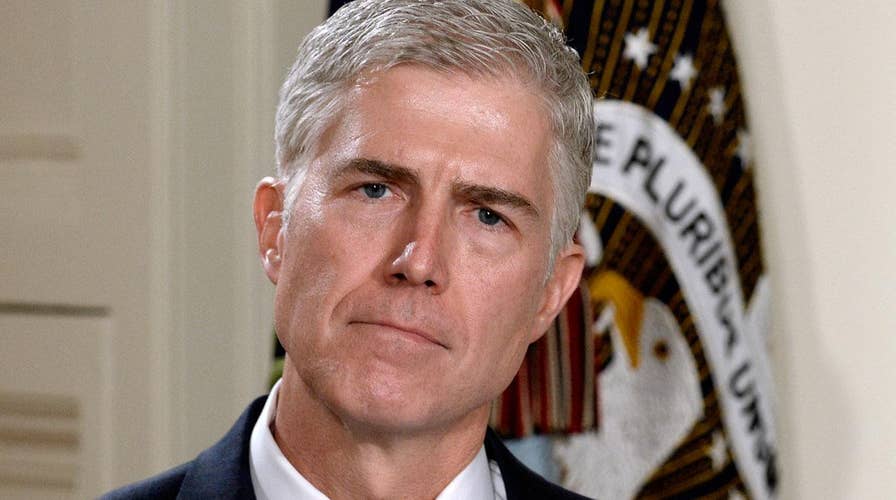Senate confirms Neil Gorsuch to Supreme Court
'The O'Reilly Factor' examines the newest Associate Justice
When President Trump was running for office, one of his favorite selling points to the so-called "Never Trump" Republicans was: You can take me, or you can choose Hillary Clinton and get stuck with her justices.
The strategy proved effective.
Conservative radio host Hugh Hewitt wrote a column in The Washington Examiner titled, “It’s the Supreme Court, Stupid.”
“If Hillary Clinton wins, the Left gavels in a solid, lasting, almost certainly permanent majority on the Supreme Court," he wrote. "Every political issue has a theoretical path to SCOTUS, and only self-imposed judicial restraint has checked the Court's appetite and reach for two centuries."
Supreme Court appointments was a main focal point during the campaign because there was a vacancy. Conservative Antonin Scalia had died. Hours after his death, Senate Majority Leader Mitch McConnell, R-Ky., announced that his chamber would not consider an Obama nominee and would instead wait until the new president was elected. There were 11 months left in Obama’s term at the time.
McConnell’s gambit worked. Obama's nomination, Judge Merrick Garland never saw the light of day, and Trump defeated Clinton.
Trump nominated Judge Neil Gorsuch who—thanks to the Republican-controlled Senate’s decision to go nuclear—is set to be sworn in on Monday. The tilt of the court has regained its conservative tilt.
As soon as April 13, Gorsuch could take part in his first private conference, where justices decide whether to hear cases — and some of them could involve gun rights, voting rights and a Colorado baker's refusal to design a cake for a same-sex couple's wedding, The Associated Press reported.
But just as Gorsuch begins to get comfortable in his new chambers, Supreme Court observers are considering the real posibility that Trump could name additional justices. The court is collectively older than any other on record. Ruth Bader Ginsburg, Anthony Kennedy and Stephen Breyer are 84, 80 and 78, respectively.
Gorsuch's confirmation process was fought bitterly on both sides. Democrats assailed McConnell for choosing to go nuclear. Sen. Chuck Schumer said afterwards that there's no incentive for nominees to even speak to the minority anymore.
University of California at Irvine Professor Rick Hasen warned Democrats at the height of the Gorsuch fight that they had little to gain in filibustering the nomination.
"Imagine if in a year or so Justices Breyer, Ginsburg, or Kennedy leave the Court,” he wrote on Election Law Blog. “Then things get MUCH worse from the point of view of progressives. Then Roberts becomes the swing voter and there goes affirmative action, abortion rights, etc. If you think things with the Supreme Court are bad for progressive now they can get much, much worse.”
He went on the write that a better move for Democrats was to “save the firepower for that fight. It is possible that Senators like Susan Collins would be squeamish about such a nominee, and they might not vote to go nuclear. At that point, people can take to the streets and exert public pressure.”
In August, then-candidate Trump told The Washington Post that the next president may appoint up to five justices. That would change the direction of the court for decades. Trump’s first nomination is 49 years old.
The Washington Examiner, citing a Trump associates, repeated Trump's campaign number Friday. He “expects to name five to the court.”





